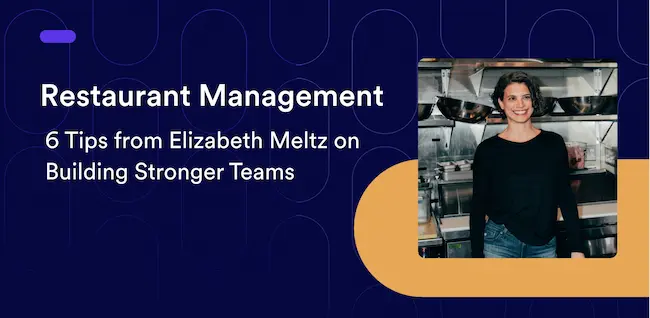Last year on The meez Podcast, host Josh Sharkey met with Franklin Becker, an award-winning chef, entrepreneur, and philanthropist, about his unique leadership philosophies and how they have shaped his success over a remarkable 30-year career.
This post explores Becker’s insights on cultivating high-performing culinary teams and the essential qualities that define effective chef leadership.
Lesson 1: Build Leaders, Not Managers
Franklin Becker emphasizes the importance of cultivating leaders rather than merely managing staff. His extensive experience in the culinary field has led him to understand the fundamental differences between a leader and a manager.
“A leader is inspiring. A leader knows when to step in and when to step out. A leader sets the tone and a leader guides a team with conviction. A manager follows rules that are set out. They keep things in order. Maybe they control the food cost, maybe they control the labor cost, but they don't have that sense of inspiration that is necessary.”
Leaders inspire and empower their teams to take ownership of their work, while managers often adhere to established rules, maintaining order without fostering personal growth.
Becker’s philosophy encourages chefs to become sources of inspiration, guiding their teams toward excellence. He reflects on how important it is for chefs to be passionate and committed, no matter the scale of their dishes, whether it's a gourmet plate or a simple hot dog. Becker states, “You gotta strive to be the best at whatever you do... your real purpose is to make people happy with what you do.”
Lesson 2: Be Inclusive
Becker's journey as a father of a child on the autism spectrum has profoundly influenced his leadership style. His experiences have taught him the significance of inclusivity in the kitchen. Through his son, he realized the necessity of understanding each person's capabilities, and how everyone acts for a reason, especially in the high-pressure atmosphere of a kitchen.
“My son looks at the world in a positive way, and he changed my approach to the way I lead and the way I teach because I realized that not everybody's the same. And people have different motivations and different capabilities, and you have to tap into those. You have to find what somebody's superpower is and tap into it and allow them to grow and nurture that experience.”
His son also taught him that not everyone will be receptive to guidance. “Some people listen, while others may insist they know it all,” he notes, emphasizing that such situations are inevitable. It's crucial not to be discouraged by others' perceptions or feelings.
Instead, he encourages leaders to persistently engage with each individual and strive to uncover their hidden strengths. “Sometimes, they don't even realize they have it,” he adds, highlighting the importance of fostering self-awareness and growth among team members.
Lesson 3: Create a Culture of Passion
For Franklin Becker, cultivating a culture of passion and excellence is non-negotiable. He believes that every dish, no matter how simple, should be crafted with care and conviction.
“You gotta strive to be the best at whatever you do. I don't care if you're making a hot dog or if you're making a hamburger, or if you're making something topped with foie gras. At the end of the day, you need to be a person of conviction and a person that's full of passion.”
This unwavering dedication to quality lays the groundwork for his team to balance artistic expression with guest satisfaction. Becker firmly asserts that “I don't accept mediocrity. I think mediocrity is what has paralyzed this country in many ways and certainly our industry.” His passion not only fuels his own growth but also enhances the overall dining experience.
He emphasizes the responsibility chefs hold in fulfilling guests' desires, noting, “You're not cooking for yourself... your real purpose is to make people happy with what you do.” Even if it means preparing a dish he personally dislikes, such as a well-done steak, Becker believes in delivering what the guest wants: “If a person wants a well-done steak, then give them a well-done steak, And make sure it is good.”
This commitment to excellence translates into a collective responsibility for chefs. Becker reflects, “The youth sometimes gets caught up. They forget the fact that we have a responsibility and the responsibility is to make a person happy when they're in our restaurant.” By instilling these values, he fosters an environment where each chef feels motivated to contribute their best efforts.
Lesson 4: Build Strong Systems
Becker believes that strong systems are crucial for operational success and effective team management. He has learned the importance of establishing effective systems that allow for efficiency and consistency within the kitchen.
“I wouldn't be able to create 70 items on my menu if I didn't have systems in place. There's always gonna be a chef's need to tweak that recipe, but with systems like meez, it gives you a baseline and it gives you control.”
These systems, which includes using meez for recipe formulations and costing, not only helps Becker maintain quality but also provide a baseline for operations, ensuring that everything runs smoothly. Becker emphasizes the need to be proactive rather than reactive: “You can tell when a person's not happy in your kitchen... it’s your responsibility as a leader to figure that out quickly.”
He underscores the necessity of constant communication and being attuned to the staff's needs, helping to mediate conflicts before they escalate. He notes that running a kitchen often requires wearing many hats, saying, “You’ve gotta be a psychologist, you’ve gotta be a businessman, you’ve gotta be a cook... and you’ve gotta know when to put on the right hat.”
Lesson 5: Stay True to Your Vision
Maintaining a clear vision, even under pressure, is essential for long-term success. Becker emphasizes the importance of adhering to one’s core values.
“You have to stay true to your vision. It's very important. And don't get discouraged. You have to know when to cut bait. Be smart but at the same time have conviction.”
By recognizing market needs while remaining steadfast in his culinary principles, Becker ensures that his restaurants stay aligned with their identity, ultimately leading to sustained success. He recalls the early days of opening Little Beet, where he resisted pressure to compromise the gluten-free concept: “I was like, no, this place is gluten-free. It's gonna remain gluten-free... there was a need for it.” Becker reminds chefs to hold their conviction and be willing to pivot when necessary, but not at the expense of their vision.
Lesson 6: Meet People Where They Are
Becker’s experiences with his son have deepened his understanding of communication and individual differences.
“Everybody communicates differently, and you just have to meet people where they’re at.”
The pressures of the kitchen can often lead to misunderstandings and frustration. Becker reflects on the traditional kitchen culture he experienced in the late nineties and early 2000s, where yelling and shouting were common responses to mistakes. He notes that this approach is not conducive to effective learning or inspiration: “You just get screamed at... and it’s just not a great way to get people to do what you need them to do.”
Instead of reacting with frustration, Becker advocates for a more empathetic approach. He urges leaders to consider the underlying reasons behind a team member's struggles: “If there's no cook that's messing up, why? Maybe there's something else going on. Maybe they don't know how to communicate that they don't understand something. Maybe they learn a different way.” This shift in perspective fosters an environment of understanding and support, which can lead to better performance and collaboration.
Lesson 7: Find Inspiration Anywhere
Inspiration plays a crucial role in Franklin Becker’s leadership philosophy. He believes that cooking and leading should be approached with passion and a commitment to excellence.
This intensity is not only about producing exceptional dishes; it's also about cultivating an environment where creativity and motivation can flourish for young chefs who may feel lost or misguided. For example, he encourages them to appreciate the inherent beauty of ingredients in their raw state.
“How about being impressed by how beautiful that product is in its raw state? Taking spring's first asparagus and cooking it gently in a little bit of butter and water and letting it kind of come to life. Inspiration is all around us.”
For Becker, inspiration is not just a motivational tool; it’s essential for building loyalty among team members. His son helped him build a strong belief that everyone has something valuable to offer. He asserts that once leaders find and nurture these contributions, they can build a loyal team: “Once you do, these people will be loyal to you. They will follow you. They will become your future generals, your future commanders in chief.”
Becker warns against fostering a culture of blind allegiance. He says, “I don't want to create a cult. I don't want to create something where everybody follows the leader.” Instead, he advocates for an environment where diverse perspectives are welcomed and valued. “Everybody has to provide their point of view,” he emphasizes, believing that the collective wisdom of a team is far greater than any single individual’s vision.
Lesson 8: Let Go of Control
Empowering others can be challenging, but it is essential for fostering growth. Becker reflects on his journey of learning to relinquish control.
“You have to learn to be a coach. Tap into the skills that a person has and if they want to grow into more, then teach them."
When challenges arise, Becker advises leaders to manage their emotions constructively, stating, “Of course you have to stand firm on what it is you believe... redirect your anger,” encouraging teaching rather than reprimanding.
Becker's relationship with his Chef de Cuisine, Alex Xinis, exemplifies this approach. While Alex is an exceptional cook, Becker notes, “Did he know how to lead? Very different skills.” Through open communication, he allows Alex to showcase his talents while offering guidance to develop his leadership skills.
He also shares the story of long-time prep cook Tomas, who excels in his role without wanting to take on leadership responsibilities. Becker respects Tomas's preference to remain a prep cook, stating, “He doesn’t want to be a leader. He wants to be a prep cook. That’s what he wants to do.” By valuing Tomas's contributions and not pushing him into a role he doesn’t desire, Becker demonstrates the importance of aligning individual strengths with the right positions.
Ultimately, Becker believes in nurturing each team member's strengths: “If they wanna grow into more, then teach them.” By fostering an environment that values empowerment and communication, he builds a cohesive team that reduces turnover. “When you start looking at management that way, people will stay with you,” he asserts, reinforcing the value of creating a supportive culture in the kitchen.
Conclusion
Franklin Becker’s insights on leadership in the kitchen offer invaluable lessons for chefs and culinary professionals. By empowering others, fostering a culture of passion and excellence, and recognizing the unique strengths of each team member, leaders can create environments where culinary talent thrives.
For more insights from Chef Franklin Becker, be sure to listen to The meez Podcast.



.webp)



